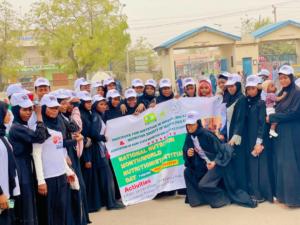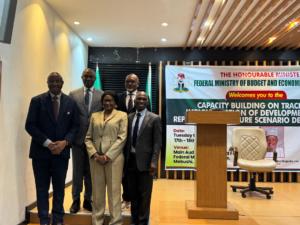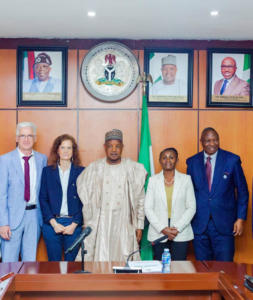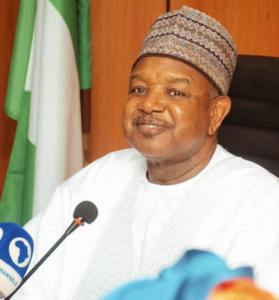The International Cooperation Department is responsible for managing multilateral and bilateral economic cooperation, including development aid and technical assistance programmes. The department is divided into two divisions, namely:
The European Union (EU) Unit is responsible for coordination of all EU supported Programmes/Projects in Nigeria. The Unit is responsible for the administration of EU projects, as well as monitoring of EU Programmes in Nigeria. The source of funding is the European Development Fund (EDF). The EU adopted two approaches namely programming study and quick start package to implement its programmes and projects in Nigeria. Nigeria and EU has produced the Country Strategy document and the National Indicative Programme (NIP). The focal sectors include:
- Bilateral Economic Cooperation (BEC) Division; and
- Multilateral Aid Division
Bilateral economic cooperation division (BEC)
Bilateral Economic Cooperation (BEC) division in collaboration with the other Government agencies seeks to enlarge development opportunities for the country through Bilateral Economic Cooperation with other countries. The division deals with economic and social relations with foreign countries and institutions on bilateral basis, i.e on a country or institution basis. The division is divided into five sections which are:
- Asia-Pacific/China/Vietnam/Japan-JICA/South Korea-KOICA and India
- Joint Commission- Africa and Middle East
- Europe and America/INGO and NGO; and
- Asia-Pacific
Asia Pacific
The countries under Asia and Pacific regions have bilateral agreement with the Nigerian government. These countries include Japan, China, Australia, India, South Korea, Indonesia, Malaysia and Singapore. The assistance received from these countries through some of their institutions like Japan – JICA, South Korea – KOICA covers the following:
- Full fellowship for capacity building in almost all disciplines in the donor countries of residence
- Technical Assistance at both the Federal and state levels of government; and
- Sectoral development including sponsoring of capital projects/programmes in the areas of education, health, power, water resources, science and technology etc both at federal and state level.
CHINA
Nigeria-China bilateral economic cooperation has been in existence for long. The Government of the two nations initiates and implements programmes and projects that enhance and strengthen the existing ties, which also impact positively on the lives of the people of the two countries.
The Chinese Government runs capacity building programmes on annual basis to improve the capacity and competence of government officials across the federation. Other areas of Chinese Government interventions include education, water and sanitation, infrastructure etc.
Joint/bilateral commissions
Joint/Bilateral Commissions are a convenient legal framework for the negotiation, elaborating and implementation of instruments covering various sectors of activities for the benefit of the nationals or contracting parties. As a joint collaborative action, it is aimed at achieving rapid and sustainable socio-economic development. Nigeria has concluded a total of 400 (four hundred) Bilateral/ Joint Commission Agreements in various sectors of the economy and has Joint Commissions with eighty-five countries.
While the Ministry of Foreign Affairs provides the focal point for negotiation of these Instruments of Cooperation, National Planning Commission has the statutory mandate of monitoring implementation of Agreements and projects issuing from such bilateral instruments. This is usually achieved through regular inter-ministerial meetings to assess the levels of implementation of the decisions reached at Joint Commissions as well as physical monitoring of related projects to ensure that Nigeria derives maximum benefit from them. In line with its mandate the National Planning Commission has carried out a comprehensive/ critical review of the Bilateral Bi-national Joint Commission.
Europe and America
This unit is responsible for bilateral activities with Europe and America region. Currently Nigeria has bilateral economic cooperation with some countries from these regions through different programmes/projects implemented in different locations of Nigeria. The list of bilateral donors from this region isstated below:
This unit is responsible for bilateral activities with Europe and America region. Currently Nigeria has bilateral economic cooperation with some countries from these regions through different programmes/projects implemented in different locations of Nigeria. The list of bilateral donors from this region is stated below:
- Agency Francise de Development (AFD)
- German International Cooperation (GIZ)
- Department for International Development (DFID)
- United States Agency for International Development (USAID)
- Canadian International Development Agency (CIDA)
INGOs/NGOs UNIT
The Unit registers, coordinates and monitors the activities of all International Non-Governmental Organizations (INGOs) and Local Non-Governmental Organizations (NGOs) in the country as part of the Ministry’s mandate for coordinating Development assistance and Aid inflow in the Country.
The following are steps to register an INGO/NGO in the Ministry.
Multilateral Division.
This division is responsible for coordinating development assistance from Multilateral Development partners namely, the United Nations and the European Union. In line with its mandate, the division comprises two units:
United Nations Development System Unit
The United Nations Development System (UNDS) Unit coordinates and tcollaborates with all the United Nations Agencies in Nigeria which comprises UN Agencies. The Agencies include
The Unit also deals with matters relating to Regional Economic Cooperation including the Commonwealth Organization and the Economic Community of West African States (ECOWAS) as well as manages the Development Assistance Database (DAD), where Development Partners report their programmes and projects in Nigeria. The United Nations Sustainable Development Cooperation Framework (UNSDCF) 2023-2027 which is an instrument of programme implementation for the country was developed in conjunction with the UN Agencies. Some of the projects implemented by these Agencies are:
- United Nations Development Programme (UNDP), the Agency’s overall goal is to contribute to sustainable human development, and four focus areas of its mandate are: Poverty reduction and achievement of the sustainable development goals (SDGs), democratic governance, environment and energy for sustainable development, and Crisis prevention and recovery.
- United Nations population Fund (UNFPA), the Agency’s interventions focus on promoting sexual reproductive health and rights, family planning, population development and dynamics.
- United Nations children’s Fund (UNICEF), the Agency mandate is promoting the rights of children, preventing the spread of diseases, advocating for clean water, sanitation and hygiene,
- International Organization on Migration (IOM), is the UN agency responsible for leading inter-governmental organization in the field of migration and works closely with governmental, intergovernmental and non-governmental partners.
- UN-WOMEN is dedicated to gender equality and empowerment of women,
- United Nations Industrial Development Organization (UNIDO), the Agency’s mandate is to promote and accelerate inclusive and sustainable industrial development in Nigeria.
- United Nations Office on Drug and Crime (UNODC), focuses on drug related issues, work with the Federal Government, judiciary, civil society organizations to make Nigeria free from drugs, crime and terrorism.
- United Nations Office for Project Services (UNOPS), the Agency supports the development sustainable development,infrastructure and renewable energy across the country.
- World Health Organization (WHO), is working to promote health, keep the world safe and serve the vulnerable.
European Union Unit
The European Union (EU) Unit is responsible for the coordination of all EU-supported programmes/projects in Nigeria. The Unit is responsible for the administration of EU Projects as well as the monitoring of EU Programmes in Nigeria. The current operational programme is covered under the Neighborhood Development International Cooperation Instrument (NDICI). The Multi-annual Indicative Programme (MIP) for Nigeria 2012-2027 focuses on three broad priority areas, namely:
- Green and Digital Economy
- Governance, Peace and Migration
- Human Development
Commonwealth
The Commonwealth Desk liaises with the Commonwealth Secretariat and coordinates the technical cooperation activities of the Commonwealth. Nigeria as a member of the Commonwealth benefits from her statutory contribution to the funds of the Commonwealth especially the commonwealth fund for technical cooperation (CFTC).
Infrastructure
Requirements For Host Country Agreement/Registration of International Non-Governmental Organizations (INGO)
- A written letter addressed to the Honourable Minister introducing your Organization.
- A brief profile of your Organization.
- A copy of Registration in the country of origin.
- Power of attorney designating the representative to Nigeria
- Mission order for the country representative to operate in Nigeria on behalf of the organization
- Names and addresses of members of the Board of Trustees
- Annual Financial Report
- Draft host country Agreement (six copies hard & soft).
- Constitution of the organization (if any)
- Tax Exemption certificate (where necessary)
- Copy of Registration certificate with CAC in Nigeria.
Requirements for Registration As NGO
- A writing letter addressed to the Honorable Minister of State, introducing your Organization.
- A brief profile of your Organization.
- A copy of the Registration Certification Certificate with the Corporate Affairs Commission (CAC).
- Evidence of Annual Returns to CAC {as stipulated under section 690 (1}
- Evidence of Office accommodation at the NGO’s headquarters or other location – (Receipt of current payment).
- Certified True Copy of the Organization’s Constitution (Original to be sighted by the Commission/Ministry).
- Certified Registration form for Incorporation of the Board of Trustees by Corporate Affairs Commission.
- Declaration of the source of funds.
- Federal Inland Revenue Service (FIRS) Tax Exemption Certificate.
- Special Control Unit Against Money Laundering (SCUML)





